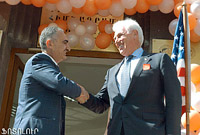The Millennium Challenge Account – Armenia (MCA-Armenia), a state non-commercial organization established by the Armenian government to oversee the implementation of a multimillion U.S. aid package, opened its new office in Yerevan yesterday. It is located near the government building of Armenia and Republican Party headquarters. Ambassador John Danilovich, the Chief Executive Officer of the U.S. government’s Millennium Challenge Corporation (MCC), with which the government of Armenia signed a $236 million Compact in March 2006, and Armenia’s Minister of Finance and Economy Vardan Khachatryan performed a ribbon-cutting ceremony that was also attended by MCA-Armenia CEO Ara Hovsepyan and Resident Country Director for MCC Armenia Alex Rassin. Danilovich said $6 million out of the funds earmarked for Armenia as part of the five-year economic assistance package have already been disbursed. “The Compact is progressing. We have begun training farmers to improve their profitability with the Water to Market Activity and design of the first phase of the Rural Roads Rehabilitation Project is nearing completion,” Danilovich said at the event. “Additionally, the early design phase of the Irrigated Agriculture Project is out for competitive bids, with initial construction expected to begin this autumn.” The Compact, which was signed on March 27, 2006, and entered into force later in September, aims at reducing rural poverty through a sustainable increase in the economic performance of the agricultural sector. Armenia plans to achieve this goal through a five-year program of strategic investments in rural roads, irrigation infrastructure, and technical and financial assistance to improve the supply of water and to support farmers and agribusinesses. The provision of the multimillion dollar funding had been largely linked with the proper conduct of parliamentary elections in Armenia. Danilovich said in this regard: “We welcomed the Armenian parliamentary elections and congratulate the Armenian people on a more successful poll than previous elections. It appears that this election was an improvement toward international standards, but we continue to closely watch the process of investigating allegations of irregularities.” He also said that as with all MCA countries, the MCC Board will make a decision on Armenia’s continued eligibility at its annual selection meeting in December. Minister Khachatryan clarified that the sum Armenia has actually received so far is $5.5 million. “But programs are in progress,” he added. He called it possible that some of the projects will remain unrealized because of the fluctuations in the dram exchange rate to the dollar. “The Corporation will not be adding anything,” Khachatryan said, but added that the government will take over and carry on where the Corporation projects stop, including with “assistance from foreign partners.” “Our ‘Lifeline Road Network’ is some 2,500 kilometers, of which only some 900 are due to be rehabilitated under the Compact. It is clear that we will do the rest,” he emphasized. According to the minister, the conditions for Armenia’s continued eligibility for the assistance program remain the same. The Compact, signed on March 27, 2006, with Entry into Force on September 29, 2006, aims to reduce rural poverty through a sustainable increase in the economic performance of the agricultural sector. Armenia plans to achieve this goal through a five-year program of strategic investments in rural roads, irrigation infrastructure and technical and financial assistance to improve the supply of water and to support farmers and agribusinesses. The program will directly impact approximately 750,000 people, or an estimated 75 percent of the rural population, and is expected to reduce the rural poverty rate and boost annual incomes. The Compact includes a USD 67 million project to rehabilitate up to 943 kilometers of rural roads, more than a third of Armenia’s proposed "Lifeline Road Network." When complete, the road network will ensure that every rural community has road access to markets, services, and the main road network. Under the Compact, the Government of Armenia will be required to commit additional resources for maintenance of the road network. The Compact also includes a USD 146 million project to increase the productivity of approximately 250,000 farm households (34% of which are headed by women) through improved water supply, higher yields, higher-value crops, and a more competitive agricultural sector. “We have four categories, with 16 indices, which are under constant monitoring,” Khachatrian said. “We’ve always had “green” evaluations of three of the four categories, which deal with economy and social issues. The only ‘red’ was with one index of the first category, called “Fair Governance”, where at least three out of six must be evaluated ‘red’ for the program to be put at risk.” In November 2006, the New York-based Freedom House urged the George Bush administration to withhold promised economic assistance to Armenia, which it believed had failed to meet “reasonable standards” for democracy and civil liberties. It charged the Armenian government had been “backsliding on promised reforms” since signing the MCA compact and accused it of ignoring U.S. calls to investigate serious fraud reported during the nationwide referendum on constitutional amendments held the previous year. However, the Armenian minister believes that the latest legislative elections in Armenia leave no room for “problems with the country’s democracy and electoral processes”. “Our elections have been evaluated as good, free and fair from all aspects,” Khachatryan concluded.

